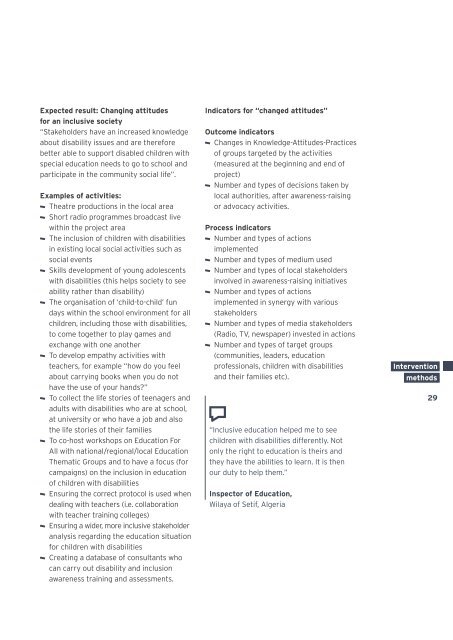Inclusive Education : Policy paper - Hiproweb.org
Inclusive Education : Policy paper - Hiproweb.org
Inclusive Education : Policy paper - Hiproweb.org
Create successful ePaper yourself
Turn your PDF publications into a flip-book with our unique Google optimized e-Paper software.
Expected result: Changing attitudes<br />
for an inclusive society<br />
“Stakeholders have an increased knowledge<br />
about disability issues and are therefore<br />
better able to support disabled children with<br />
special education needs to go to school and<br />
participate in the community social life”.<br />
Examples of activities:<br />
Theatre productions in the local area<br />
Short radio programmes broadcast live<br />
within the project area<br />
The inclusion of children with disabilities<br />
in existing local social activities such as<br />
social events<br />
Skills development of young adolescents<br />
with disabilities (this helps society to see<br />
ability rather than disability)<br />
The <strong>org</strong>anisation of ‘child-to-child’ fun<br />
days within the school environment for all<br />
children, including those with disabilities,<br />
to come together to play games and<br />
exchange with one another<br />
To develop empathy activities with<br />
teachers, for example “how do you feel<br />
about carrying books when you do not<br />
have the use of your hands?”<br />
To collect the life stories of teenagers and<br />
adults with disabilities who are at school,<br />
at university or who have a job and also<br />
the life stories of their families<br />
To co-host workshops on <strong>Education</strong> For<br />
All with national/regional/local <strong>Education</strong><br />
Thematic Groups and to have a focus (for<br />
campaigns) on the inclusion in education<br />
of children with disabilities<br />
Ensuring the correct protocol is used when<br />
dealing with teachers (i.e. collaboration<br />
with teacher training colleges)<br />
Ensuring a wider, more inclusive stakeholder<br />
analysis regarding the education situation<br />
for children with disabilities<br />
Creating a database of consultants who<br />
can carry out disability and inclusion<br />
awareness training and assessments.<br />
Indicators for “changed attitudes”<br />
Outcome indicators<br />
Changes in Knowledge-Attitudes-Practices<br />
of groups targeted by the activities<br />
(measured at the beginning and end of<br />
project)<br />
Number and types of decisions taken by<br />
local authorities, after awareness-raising<br />
or advocacy activities.<br />
Process indicators<br />
Number and types of actions<br />
implemented<br />
Number and types of medium used<br />
Number and types of local stakeholders<br />
involved in awareness-raising initiatives<br />
Number and types of actions<br />
implemented in synergy with various<br />
stakeholders<br />
Number and types of media stakeholders<br />
(Radio, TV, news<strong>paper</strong>) invested in actions<br />
Number and types of target groups<br />
(communities, leaders, education<br />
professionals, children with disabilities<br />
and their families etc).<br />
“<strong>Inclusive</strong> education helped me to see<br />
children with disabilities differently. Not<br />
only the right to education is theirs and<br />
they have the abilities to learn. It is then<br />
our duty to help them.”<br />
Inspector of <strong>Education</strong>,<br />
Wilaya of Setif, Algeria<br />
Intervention.<br />
methods .<br />
29

















